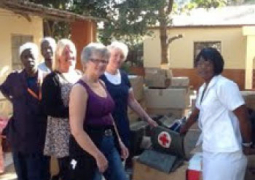More than a third of mankind is at risk of contracting malaria. We've been told this for years but now it's been proved: an international team has just published a map which shows, region by region, the risk of contracting the disease.
As part of the Malaria Atlas Project, Professor Robert Snow and his colleagues have gathered together data on 87 countries. They have also studied the climatic parameters, in particular the temperature and humidity levels required for the presence of the anopheles mosquito, the vector of plasmodium falciparum.
Malaria affects more than two billion people across the world. In total, the disease claims more than 2 million lives every year. And in sub-Saharan Africa alone, it causes the deaths of more than 3,000 children every day.
How to calm a crying baby .
It's hardly breaking news! During the first three months after birth, babies cry, and cry a lot. In fact it's their only real way of communicating. Contrary to received wisdom, leaving a baby to cry doesn't solve anything. He or she will only get more distraught. So here are a few simple suggestions for helping to calm your baby down:
* Hunger and pain (the latter most often associated with colic) are the most common reasons for crying. The best way of calming a baby down is often to allow him to suckle.;
* Give him a cuddle! Loving contact is often enough to stop a baby crying;
* Try rocking your baby. It will calm him down. and it's good for parents too;
* Walking around can sometimes be very helpful, particularly after bathing your baby or changing his nappy. There's no need to go very far. Just hold him in your arms and walk around inside the house;
* Another useful idea is massage! Particularly on your baby's tummy or back. He will find the touch of your hands comforting;
* Give him something to suck. Your little finger (providing it's clean of course), or a dummy;
* Make your baby laugh by distracting him. Babies love looking at brightly coloured or shiny objects.
If, in spite of all this, he continues crying or even screaming, have a word with your doctor. But above all never leave your baby crying and lonely for very long. He needs to know that he can count on you.
Eye floaters - what do they mean?
It's a strange sensation seeing dark shadows or tiny tadpole-like trails floating in front of your eyes . - specialists refer to them as "floaters" - but they're very common, with no fewer than one person in three affected. But be careful, there are floaters and . there are floaters.
Different types exist and when there are a lot of them and they are quite dense and unstable, they are usually due to variations in blood pressure. And naturally, if you have this sort you should see a doctor.
But very often the number of floaters in the eye can be counted on the fingers of one hand. They are minute blemishes found in the vitreous humour - this is the viscous, transparent matter located between the lens and the retina and which fills most of the eyeball.
These blemishes are in fact a kind of condensation of the vitreous humour. And they are often a sign of age. In many cases it is more common for them to occur in people who are short-sighted.
Most of the time eye floaters are insignificant. However, when they occur it means that there has been a change in your eye. You are therefore advised to consult an ophthalmologist who will check that the retina is intact and, if necessary, will carry out an in-depth examination of the eye. In rare cases, floaters can be a sign that the retina has become detached. But most often there is no cause for concern and patients and doctors can disregard them. Over the counter remedies are available for the treatment of floaters and they can really do no harm.
One last point that really does require urgent attention is if these floaters take the form of a soot-like shower. In this case you should consult your ophthalmologist immediately as it could be a sign of a micro-haemorrhage in the vitreous humour.
Migraine suffers - watch out for your eyes!
Older people with a history of migraine are more at risk of developing retinopathy. For the first time, American researchers have established a link between damage to the retina, which can lead to blindness, and migraine attack.
They reviewed the medical records of 11,000 women and men with the aim of studying eye health in patients who had suffered from migraines over a long period of time. The results show that migraine sufferers are at particular risk of retina damage. And this has nothing to do with having diabetes or high blood pressure. Other studies will of course be needed to find out more about this direct link between migraine and retinopathy.


